In the ever-evolving world of fashion, colour plays a pivotal role in defining your style, personality, and overall presence. Whether you're meticulously selecting an outfit for a special occasion or simply getting dressed for the day, the hues you choose can have a profound impact on how you look and feel. Among the myriad choices in the fashion spectrum, one element stands as a timeless and versatile piece. Moreover, it is capable of elevating your appearance with a touch of elegance – the illustrious Pashmina shawl.
As you wrap yourself in the soft embrace of a Pashmina, you're making a statement about your sense of style. Pashmina shawls are far more than mere accessories; they are works of art. Crafted with painstaking precision, each Pashmina is a canvas that artisans adorn with a plethora of colours, each telling its own story. Patrons have cherished them for generations, transcending time and culture. But now, they're waiting for you to weave your narrative into their fibres.
So. let's explore the fundamentals of colour theory, and understand how skin undertones influence your choices, besides learning how different colours can evoke various emotions. We'll delve into the subtleties of warm and cool tones and uncover the secrets of pairing colours for different occasions. We will also discuss the psychological impact of your choices. From selecting colours for daily wear to making a bold statement at a formal event, this blog will be your trusted companion in the realm of Pashmina colours.
So, join us on this chromatic journey. Let's unravel the beauty and power of colour within the world of pashmina. As we explore the palettes and possibilities, you'll discover how to choose Pashmina colours that truly resonate with your unique style and grace.
Understanding Colour Theory
Colour theory is the foundation upon which the art of choosing Pashmina colours that suit you is built. Understanding the basics of colour theory empowers you to make informed choices, ensuring your Pashmina selections resonate harmoniously with your appearance and personality.
At its core, colour theory revolves around the colour wheel, which categorizes colours into primary, secondary, and tertiary groups. Primary colours are red, blue, and yellow, from which all other colours are derived. Mixing two primary colours yields secondary colours, such as green, purple, and orange. Tertiary colours result from mixing a primary and a neighbouring secondary colour. A colour wheel is a tool used to visualize how colours relate to one another and how they can be combined effectively.
Pashmina colours and undertones
When it comes to choosing Pashmina colours that complement your appearance, understanding your skin's undertones is crucial. Skin undertones fall into three main categories: warm, cool, and neutral. Warm undertones have hints of red, yellow, or peach, while cool undertones feature shades of pink, blue, or violet. Neutral undertones possess a balance of both warm and cool tones, creating a more versatile canvas.
Colours can also be classified into warm, cool, or neutral categories. Warm colours, like reds, oranges, and yellows, have undertones that align with warm skin tones. They exude energy and evoke feelings of warmth and comfort. Cool colours, such as blues, purples, and greens, resonate with cool undertones in the skin and evoke a sense of calm and tranquillity. Neutral colours, like greys, beiges, and muted earthy tones, have the flexibility to complement a wide range of undertones.
So, remember that this knowledge of colour theory serves as the foundation upon which we'll build more intricate strategies. The next steps will involve understanding how these colour principles apply to your unique skin undertones and personal preferences, enabling you to select Pashmina colours that enhance your natural beauty and express your individual style.
Warm Undertones

Warm undertones in the skin are characterized by subtle hints of red, yellow, or peach beneath the surface, giving the complexion a radiant and sun-kissed appearance. People with warm undertones tend to tan easily and may have freckles. The veins on the underside of their wrists often appear more greenish, and gold jewellery typically enhances their natural glow.
When selecting Pashmina colours to complement warm undertones, it's essential to opt for shades that harmonize with the warmth of your skin. The key is to choose colours that bring out the best in your complexion and create a balanced, cohesive look. Here are some Pashmina colour suggestions for those with warm undertones:
Pashmina colour suggestions for warm undertones:
- Earth Tones: Earthy shades like terracotta, camel, and olive green complement warm undertones beautifully. These colours enhance the natural warmth of the skin, creating a harmonious and balanced appearance.
- Golden Yellows: Shades of golden yellow, mustard, and saffron can be particularly flattering for those with warm undertones. These colours add a vibrant and sunny dimension to the complexion.
- Warm Reds: Warm undertones are perfectly suited to rich, warm reds such as brick red, coral, and tomato red. These shades amplify the natural warmth in the skin and create a striking contrast.
- Peachy Pinks: Opt for pinks with peachy or apricot undertones. These shades, such as salmon or coral pink, impart a healthy flush to the cheeks and lips while enhancing your skin's warmth.
- Warm Neutrals: Warm neutral shades like camel, tan, and beige are versatile and can be effortlessly integrated into your wardrobe. They provide a soft, elegant backdrop for your overall look.
- Oranges: Warm undertones pair well with orange hues, such as burnt orange and pumpkin. These colours can be invigorating and uplifting, complementing your skin's radiance.
Remember that personal preferences also play a significant role in colour selection. While these suggestions can guide you, don't hesitate to experiment with different shades to discover the pashmina colours that make you feel the most confident and comfortable. Ultimately, the goal is to highlight your natural beauty and express your unique style, so trust your instincts and have fun exploring the world of pashmina colours.
Cool Undertones

Cool undertones in the skin exhibit subtle hints of blue, pink, or purple beneath the surface. People with cool undertones often have fair or pale skin that burns more easily in the sun. The veins on the underside of their wrists typically appear bluish, and silver jewellery complements their complexion beautifully.
When selecting Pashmina colours to complement cool undertones, it's essential to choose shades that harmonize with the cool, rosy undertones in your skin. Here are some Pashmina colour suggestions for those with cool undertones:
Pashmina Colours for Cool Undertones
- Cool Blues: Shades like cobalt blue, periwinkle, and sapphire can be very flattering for cool undertones. These colours mimic the coolness of your complexion and create an elegant contrast.
- Lavender and Lilac: Pastel shades of lavender and lilac bring out the rosy undertones in cool skin. These colours offer a soft and romantic appearance.
- Soft Pinks: Cool undertones pair well with soft, cool-toned pinks, such as baby pink or ballet slipper pink. These hues complement your skin's natural coolness and create a fresh and youthful look.
- Mint Greens: Colours like mint green and seafoam green can add a refreshing touch to your outfit. They enhance the coolness of your skin, creating a harmonious ensemble.
- Cool Grays: Cool undertones work wonderfully with cool shades of grey. Opt for colours like dove grey, silver, or steel grey. These neutrals provide an elegant and sophisticated backdrop for your attire.
- Jewel Tones: Deep jewel tones, including emerald green, amethyst purple, and royal blue, can create a striking contrast with your cool undertones. These rich, vibrant colours are ideal for special occasions.
To combine these colours for different occasions, consider the following:
- Everyday Wear: Soft pinks, mint greens, and cool blues can be your go-to choices for casual outings. These colours impart a fresh and approachable vibe.
- Formal Events: For formal events or evening occasions, jewel tones like amethyst or sapphire can make a bold statement. Pair these colours with elegant outfits for a captivating look.
- Professional Attire: Cool greys and deep charcoals are excellent choices for professional attire. They convey a sense of sophistication and competence.
- Accessories: You can also incorporate these pashmina colours as accessories to add a pop of cool-toned charm to any outfit. Whether it's a shawl, scarf, or wrap, Pashmina accessories can effortlessly elevate your look.
Neutral Undertones
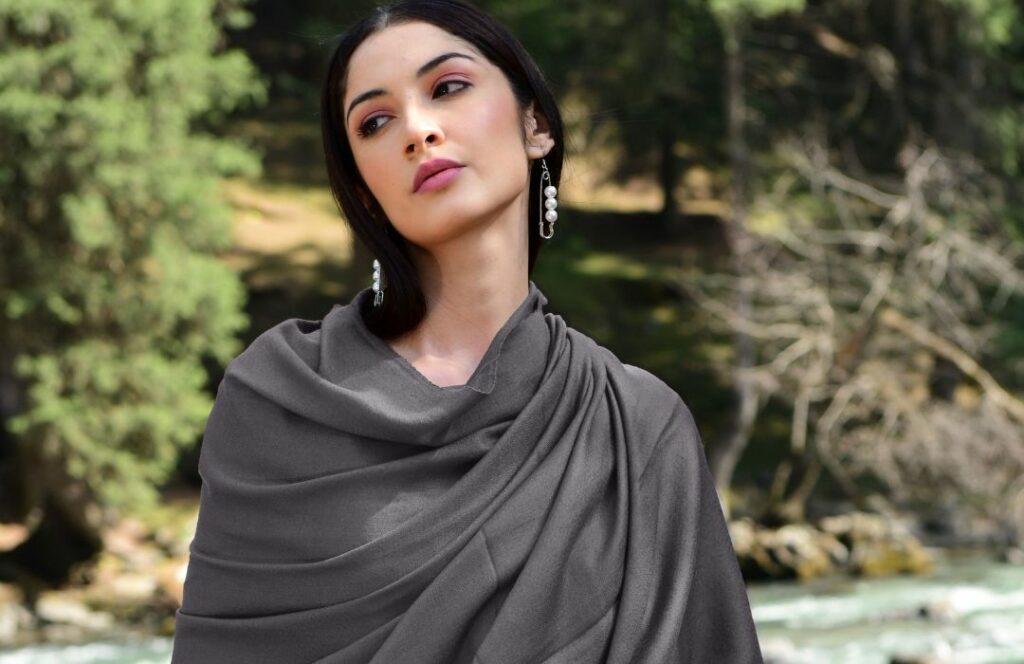
Neutral undertones are a versatile and intriguing category within the realm of skin tones. They are often considered the middle ground, neither leaning distinctly warm nor cool. Individuals with neutral undertones have a balanced complexion that doesn't display strong hints of yellow, pink, or blue.
To identify neutral undertones, you can perform the vein test: check the colour of your wrist veins. If they appear to be a mix of both blue and green or if they are simply hard to categorize as blue or green, you likely have neutral undertones. Additionally, when you wear white, it neither makes your skin appear excessively yellow nor overly pink, demonstrating your balanced complexion.
The beauty of having neutral undertones is that you can pull off a wide range of colours with ease. Neutrals complement your skin tone gracefully, and you can experiment with various shades to create different looks. Here are some pashmina colour recommendations for those with neutral undertones:
Pashmina Colours for neutral undertones
- Classic Black: Black is universally flattering, and it complements neutral undertones exceptionally well. A black Pashmina can add elegance and versatility to your wardrobe.
- Navy Blue: Navy is a sophisticated and timeless colour that pairs effortlessly with neutral undertones. Whether you choose a navy Pashmina for a formal event or as an everyday accessory, it's a winning choice.
- Soft Grey: Neutral undertones can pull off various shades of grey, from light heather grey to charcoal. Gray Pashminas offer a modern and polished look.
- Taupe: Taupe is a warm, earthy shade that complements neutral undertones without overwhelming the balance. It's an excellent choice for a neutral-toned Pashmina.
- Muted Pastels: Neutral undertones can explore soft pastel shades like blush pink, lavender, and powder blue. These colours provide a delicate and charming touch to your outfit.
- Olive Green: The subtle warmth of olive green works beautifully with neutral undertones. It adds a touch of nature-inspired colour to your ensemble.
- Rich Burgundy: Deep, rich colours like burgundy or maroon can create a striking contrast with neutral undertones. They are perfect for special occasions or when you want to make a statement.
The versatility of neutral undertones means that you have the freedom to choose colours according to your mood and the occasion. You can comfortably wear both warm and cool shades, allowing you to curate a diverse and balanced wardrobe. The key is to trust your instincts and choose Pashmina colours that resonate with your personal style and the look you want to achieve. Neutral undertones offer a world of fashion possibilities, so feel empowered to explore and express your unique taste.
Pashmina Colours for Different Occasions
The significance of choosing the right Pashmina colour for various occasions cannot be understated. Colours play a crucial role in setting the tone and creating the desired impact. Here's a guide on selecting Pashmina colours for different occasions:
Pashmina for Formal Events:
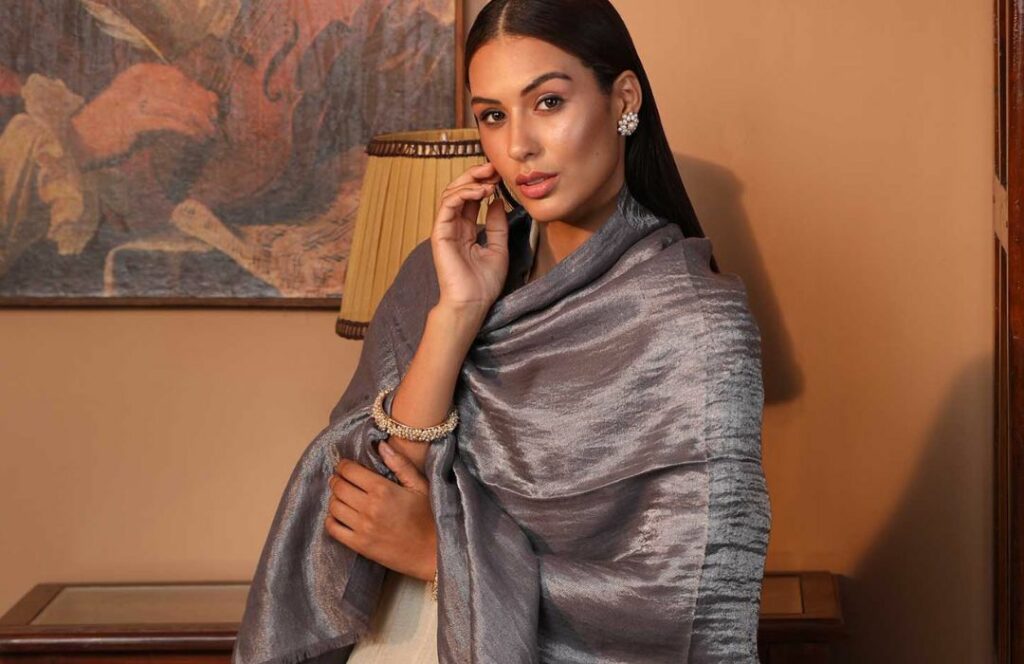
- Weddings: For weddings, especially if you're the bride or a close family member, classic colours like ivory, champagne, or silver often work beautifully. They exude sophistication and match the opulence of the event. Deep jewel tones such as deep red, emerald, or sapphire are also splendid choices.
- Corporate Functions: At formal business or corporate events, it's best to opt for subtle, understated shades. Classic black, navy or charcoal grey Pashminas complement your professional attire.
Pashmina for Casual Gatherings:
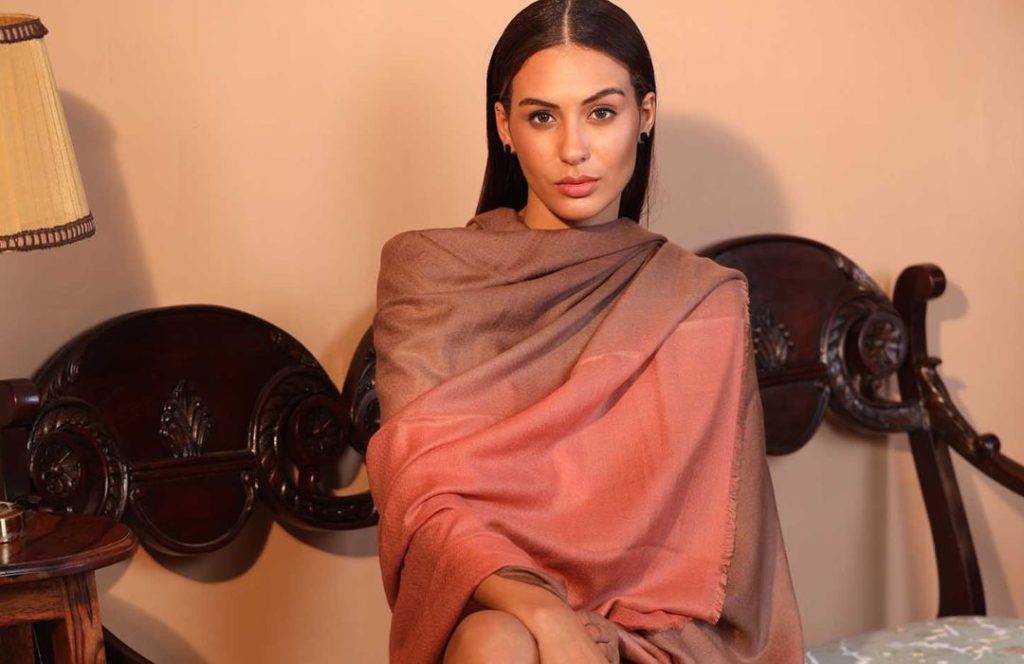
- Brunch with Friends: Casual get-togethers call for lively and cheerful colours. Soft pastels like baby blue, lavender, or mint green, as well as warm shades like coral or peach, can add a touch of playfulness to your outfit.
- Weekend Shopping: When you're out for a day of shopping or a stroll through the city, earthy tones like olive green, camel, or warm brown are cosy and stylish options. They blend well with the urban landscape.
Pashmina for Festive Occasions:
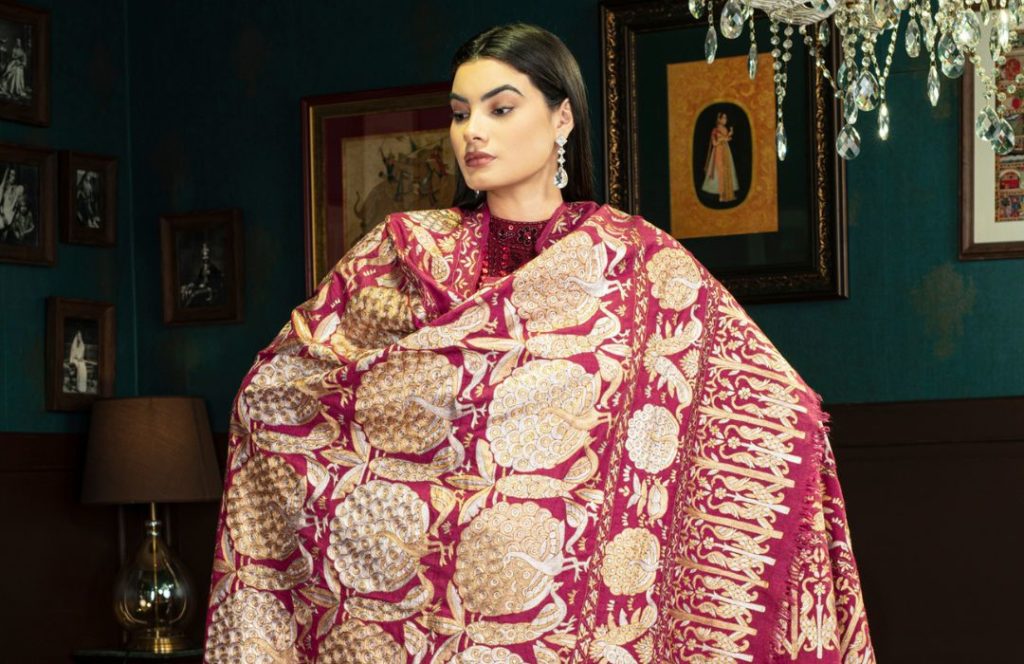
- Festivals: Festivals are all about vibrancy and joy. Bright, vivid colours like royal blue, scarlet, or deep purple reflect the celebratory spirit of such occasions. You can also experiment with gold or silver Pashminas, which have a touch of luxury.
- Holiday Parties: For holiday parties during the festive season, consider traditional colours such as deep green, rich red, or sparkling gold or silver. These hues resonate with the holiday theme and add a touch of glamour.
Pashmina for Everyday Wear:
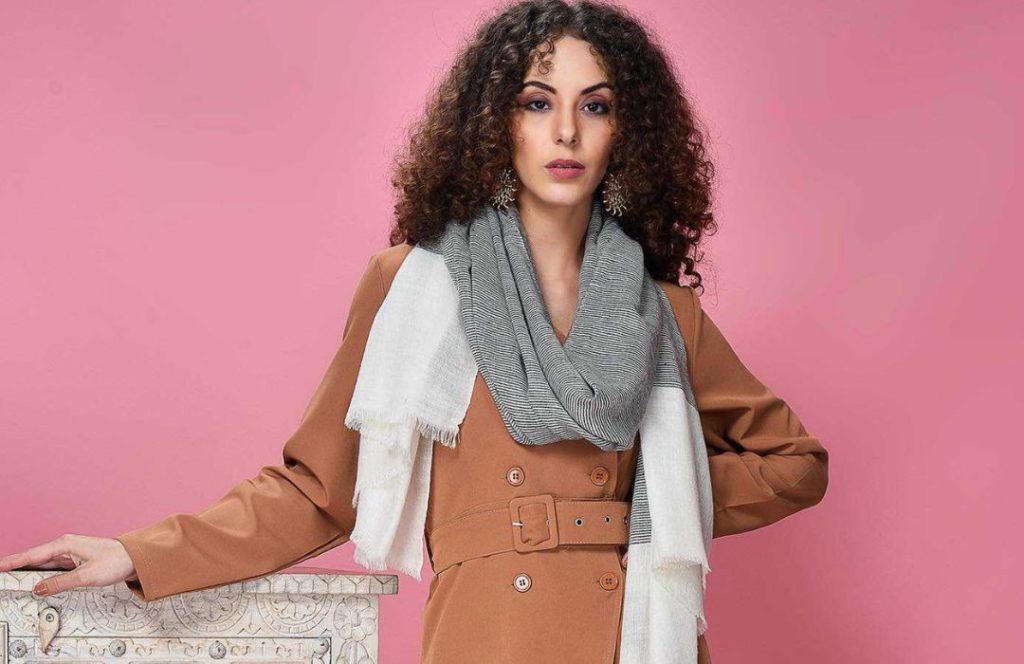
- Work Attire: If you wear Pashmina to the office regularly, consider versatile shades like grey, black navy, or soft pink. They offer an elegant touch without being too overwhelming.
- Casual Everyday Wear: For your daily Pashmina choice, earthy and neutral shades such as beige, heather grey, or soft taupe are excellent. They complement a wide range of outfits and are comfortable for daily use.
Pashmina for Special Occasions:
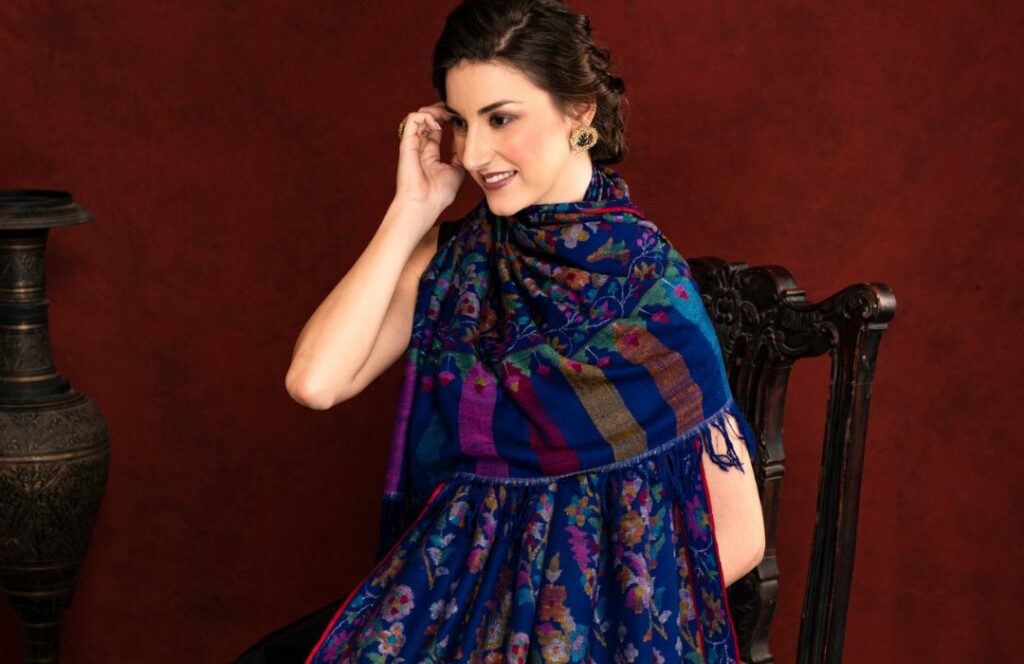
- Anniversaries or Romantic Dinners: For special dates or romantic dinners, consider romantic and sensual colours like deep burgundy, blush pink, or midnight blue. These colours set the mood for a romantic evening.
When coordinating your Pashmina with your outfit, it's important to consider the overall colour scheme. Your Pashmina doesn't have to be an exact match, but it should harmonize with your attire. Additionally, be mindful of the season, as certain colours are more appropriate for different times of the year.
Choosing the right Pashmina colour for an occasion can elevate your style and help you make a statement. Don't hesitate to experiment with different shades and find the colours that resonate with your personal taste and the ambience of the event.
Colour Psychology and Pashmina
Colour psychology is a fascinating field that delves into the emotional and psychological impact of colours on individuals. The colours you wear can influence not only your own mood but also how others perceive you. Understanding colour psychology is essential when choosing Pashmina colours that resonate with your emotions and the message you wish to convey through your fashion choices.
Red
The colour red is often associated with strong emotions like love and passion. It's a bold and attention-grabbing hue, making it ideal for special occasions where you want to stand out. Wearing a red Pashmina can evoke feelings of confidence and power, perfect for making a statement.
Blue
Blue is known for its calming and soothing effects. It conveys a sense of trust and reliability. Light blue shades are great for work attire, as they promote a feeling of professionalism and approachability. Darker blues are associated with strength and dependability.
Green
Green represents growth, renewal, and balance. It's a colour that invokes feelings of harmony and tranquillity. Wearing green Pashminas can create a refreshing and calming effect. It's an excellent choice for both casual and formal occasions, especially in natural, earthy tones.
Yellow
Yellow is the colour of optimism and energy. It's often associated with happiness and creativity. Wearing a yellow Pashmina can uplift your spirits and exude positivity. However, it's important to choose the right shade, as overly bright yellows can be too intense.
Pink
Pink is traditionally linked to femininity and sweetness. It's a colour that conveys warmth and compassion. Wearing a pink Pashmina can evoke feelings of tenderness and love. It's perfect for romantic occasions or when you want to create an approachable image.
Black
Black is a powerful and timeless colour. It represents sophistication and elegance. It's an excellent choice for formal events and professional settings. Wearing a black Pashmina can make you appear authoritative and chic. It's also slimming and versatile, making it a staple in many wardrobes.
White
White symbolizes purity, cleanliness, and simplicity. It's a colour that exudes a sense of serenity and clarity. White Pashminas are classic and perfect for special occasions like weddings. They can create an aura of purity and simplicity.
Using colour psychology to your advantage in fashion means understanding the emotional responses that specific colours evoke and choosing colours that align with the mood and message you want to convey. When selecting Pashmina colours, think about the emotional impact you want to achieve, and consider the context of the occasion. A well-chosen Pashmina can not only enhance your outfit but also influence your own and others' perceptions of you.
How do seasons affect colour preferences?
Seasons play a significant role in influencing our colour preferences. Our surroundings change with the seasons, and these changes often impact the colours we are drawn to. When it comes to Pashmina colour choices, understanding the seasonal influence is a valuable guide to keeping your fashion in harmony with nature.
Spring
Spring is a time of renewal, growth, and blooming flowers. The colour palette of spring reflects these themes, featuring soft, pastel shades that symbolize new beginnings. Pashmina colours like pale pink, lavender, mint green, and soft yellow are perfect choices for spring. These colours evoke the sense of freshness and are ideal for both casual and formal spring occasions. You can style your Pashmina with lighter fabrics and floral patterns to embrace the spirit of the season.
Summer
Summer is the season of warmth, sunshine, and outdoor activities. People are drawn to bright, cheerful colours that reflect the energy of the season. Vibrant Pashmina shades such as coral, turquoise, lemon yellow, and sky blue resonate with summer's vitality. These colours are versatile and can complement summer outfits, whether it's a beach vacation or a casual evening party. Lightweight Pashmina wraps or scarves are perfect for cooler summer evenings.
Fall
Autumn brings a transformation of nature, with leaves changing to rich hues of red, orange, and gold. The fall colour palette is warm and inviting, making it an excellent choice for Pashminas. Pashmina colours like deep burgundy, olive green, mustard, and rust align with the earthy tones of the season. These colours convey a sense of comfort and cosiness. A classic way to style your Pashmina in the fall is to pair it with earth-toned outfits and layer it over sweaters.
Winter
Winter is synonymous with cold weather and festive celebrations. The colour choices in winter often reflect the desire for warmth and merriment. Pashmina colours like deep navy, rich maroon, emerald green, and classic black are popular choices for this season. They exude a sense of sophistication and are perfect for formal winter events. You can drape your Pashmina elegantly over formal attire, and the richness of these colours complements the festive atmosphere.
Accessorizing with Pashmina
Beyond choosing the right Pashmina colours to complement your skin tone, you can also explore the versatile world of Pashmina accessories. Pashminas aren't limited to being just a shawl or scarf; they can elevate your style in countless ways.
Head Wraps
Pashminas can be artfully tied around your head, creating a chic headwrap or turban. This is a stylish way to introduce a pop of colour to your outfit or match it with an existing accent colour in your attire. Whether you're dressing for a summer day at the beach or a winter outing, a Pashmina headwrap can add flair to your look.
Belt It
Turn your Pashmina into a statement belt. This is especially effective when you want to cinch your waist and create a definition. It's a trendy way to introduce colour, texture, and a unique touch to a monochromatic outfit. You can use a Pashmina belt over a dress, tunic, or long shirt for an instantly sophisticated look.
Handbag Accessory
Tie a Pashmina around the handle of your handbag to add a splash of colour and a touch of elegance. This is a subtle way to coordinate your accessory with your outfit and make your bag stand out. Plus, it's a convenient way to carry your Pashmina with you when you need it.
Wrap Bracelet
Fold a thin Pashmina and wrap it around your wrist as a bracelet. This is a unique way to integrate the colour of your Pashmina into your overall look. You can mix and match different Pashmina bracelets with various outfits, creating a dynamic and colourful accessory.
Layering
Layering Pashminas is a fantastic way to blend colours, introduce contrast, or keep warm during colder seasons. You can wear two Pashminas of different colours, allowing one to peek out from under the other. This adds depth and dimension to your ensemble.
Pashmina as a Top
For a bold and innovative look, you can drape a Pashmina to create a unique top. Secure it with a belt or pins to ensure it stays in place. This style choice is particularly popular during the summer months, as Pashminas are lightweight and breathable.
Accessorizing with Pashmina is an art that offers endless possibilities for personal expression. By thinking outside the box and considering the various roles Pashminas can play in your wardrobe, you'll discover that these elegant pieces are not just limited to adding colour but can also elevate your style and enhance your overall look.
Seeking Opinions and Personal Style
While colour theory, skin undertones, and style guidelines are valuable tools in choosing the right Pashmina colours, there's another aspect that's equally crucial: seeking opinions and trusting your personal style.
Seeking Second Opinions
There's no harm in asking for a second opinion, especially when you're trying something new or unsure about a particular colour. Friends, family, or even fashion-savvy acquaintances can offer insights and suggestions. They might see potential in a colour that you hadn't considered. However, it's important to remember that these opinions are just that - opinions. In the end, the choice should resonate with you and your sense of style.
Personal Style Matters
While guidelines can provide a framework, personal style is a critical factor in selecting Pashmina colours. Your unique preferences, experiences, and the message you want to convey through your clothing are all integral to your style. If a colour makes you feel confident and comfortable, it's a great choice, regardless of any rules. Pashminas are not just about complementing your skin tone; they're also a canvas for self-expression.
Trusting Your Instincts
Your instincts often know what's best for you. It's perfectly acceptable to love a colour, even if it doesn't fit conventional guidelines. If a Pashmina shade resonates with you, it's likely to enhance your appearance, simply because you'll wear it with confidence. The way you carry yourself in a colour can influence how others perceive it, and this is where personal style and self-assurance come into play.
Adapt to Your Mood
The beauty of Pashmina is its adaptability. You can choose different colours based on your mood and the message you want to convey on a given day. The colour of your pashmina can reflect your emotions, whether it's the vibrancy of a red Pashmina on a day filled with energy or the tranquillity of a blue one when you seek calmness.
Experiment
Don't be afraid to experiment with colour. Fashion is a realm of creativity and self-discovery. The only way to truly understand what works for you is to try various colours, combinations, and styles. You might discover new favourites or develop a unique signature style in the process.
In the world of fashion, there are no rigid rules. Guidelines are valuable for understanding the principles, but personal style should always be the driving force behind your choices. Whether you're choosing Pashmina colours for a special occasion or daily wear, your preferences and instincts are what truly matter. In the end, the Pashmina you select should resonate with you, make you feel confident, and become a part of your individual style narrative.
Conclusion
In the world of fashion, colour is a language, a powerful tool that can influence how you feel and how others perceive you. Choosing the right Pashmina colour is an art, a delightful journey of self-expression and style. Through this blog, we've explored the intricacies of colour theory, the subtleties of warm and cool undertones, and the significance of personal style.
Pashmina, with its exceptional softness, warmth, and timeless allure, serves as a versatile canvas for this artistic expression. It's not merely an accessory but a statement, a reflection of your mood, personality, and the message you wish to convey.
While guidelines can provide a foundation, the final choice should always resonate with you. Seek second opinions if you like, but trust your instincts. Pashmina is about enhancing your unique beauty and style.
As we conclude, we encourage you to experiment, embrace your personal style, and revel in the world of fashion. Pashmina offers endless possibilities. So, whether you're attending a grand event or simply enjoying a casual day out, choose colours that make you feel confident and beautiful. Fashion is a journey, and with pashmina, that journey is a symphony of colours, styles, and, most importantly, your individuality.
Also read: Pashmina: A Symbol of Feminine Empowerment